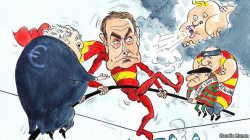Zapatero's balancing act

Nationalists to the left of him, markets to the right, Spain’s prime minister is in a tricky spot.
He was once considered a political magician, with a sleight of hand that distracted from his country’s problems. But now the circus skill needed by Spain’s Socialist prime minister, José Luis Rodríguez Zapatero, is that of a tightrope walker.
Summer holidays, Spain’s World Cup victory and positive-ish bank stress-test results have granted a lull in the storm that engulfed the country when bond markets turned their gaze from Greece to Iberia. But now Mr Zapatero must pull off a delicate balancing act if he is to stay in power until his second term formally ends in 2012. For the economy to survive, he must please the investors that lend Spain money. And for the government to survive, he must satisfy the Catalan and Basque nationalists who prop up his minority administration.
One false step and Spain risks falling back into the pit of uncertainty, with the most probable outcome early elections in spring. Mr Zapatero’s career, already damaged by his sluggish reaction to the economic woes that have pushed Spain’s unemployment rate up to almost 20%, would also crash. His Socialist Party already trails Mariano Rajoy’s conservative opposition People’s Party (PP) by 10% in the polls.
The first wobble for Mr Zapatero comes with the autumn budget debate. The arithmetic of Spain’s parliament, where the Socialists are seven seats short of a majority, and the decision of fairweather allies in left-wing and Catalan nationalist parties to withhold support, leaves the prime minister at the mercy of the six deputies of the Basque Nationalist Party (PNV).
Aware of its power, the PNV is playing tough. It has helped pass Mr Zapatero’s previous budgets, usually in return for regional investment. But as he is seeing through an austerity package that wipes out €15 billion of spending in two years, Mr Zapatero is hardly in a position to dish out pork. The PNV’s other demands, for more autonomy, may be even harder to meet. “We are ready to take part in political agreements as long as these involve full self-government,” says Josu Erkoreka, the PNV’s parliamentary leader.
This is not a call for independence, but for a range of incremental measures, varying from a right to field Basque sporting teams (at a time when most Spaniards would not look kindly upon the dismemberment of their beloved La Roja world champions) to powers over workforce training and referendums in two tiny enclaves the PNV claims should be Basque. Negotiations will be fraught.
The next wobble could come in October or November, when Catalans vote in regional elections (see article). The nationalist Convergence and Union (CiU) coalition is set to oust a Socialist-led coalition from power. That will call for adjustments to the political balance elsewhere, especially in Madrid.
CiU’s core supporters, anchored in small, family-owned businesses, are suffering as Mr Zapatero tussles with a budget deficit worth 11.2% of GDP and continuing slow growth. Mr Rajoy wants CiU, which is critical of Mr Zapatero’s lukewarm reforms, to help him oust the government. But Mr Zapatero needs CiU’s votes to pass his measures. Once the regional elections are out of the way, therefore, it will have a chance to play the two off against each other and push for further pension, labour and banking reforms. If Mr Zapatero will not go far enough, it knows that Mr Rajoy will.
There are signs that the Spanish prime minister has had a change of heart. In a revealing interview with El País on July 25th, Mr Zapatero admitted that the markets had taught him a lesson. He said that on May 9th he had a sleepless night waiting for the Nikkei to open as Europe’s finance ministers put together a deal to stave off a continent-wide sovereign-debt crisis; not the sort of comment one expects from a Socialist. He also pledged to adopt further reform measures if necessary. But no proposals are likely until after a general strike, on September 29th, called by Spain’s two largest trade unions, who are unhappy with Mr Zapatero’s new-found appetite for reform.
Like its Basque counterpart, however, CiU is likely to be tempted as much by a greater ration of self-government than by another tranche of economic reform. Over 425,000 people joined a rally in Barcelona on July 10th to protest against a constitutional-court decision to strike down some parts of the region’s 2006 autonomy charter and limit others. An unstable Zapatero government offers opportunities that the centralising PP would not. And political instability suits the Catalans: in the past they have got more when Madrid has had a minority government, says Salvador Giner, head of the Catalan Studies Institute.
But if the reform programme stalls and Spain flops back into recession, Catalan and Basque nationalists may abandon Mr Zapatero, making a 2011 election—and a PP government—likely. It is still unclear, however, what a government run by Mr Rajoy would do. The PP leader promises reform, but avoids going into detail. The glee with which his party recently announced it had stopped a rise in electricity charges has caused alarm. They are interventionists, says one glum energy sector executive.
Spaniards have grown used to Mr Zapatero’s showmanship. The first six months of this year, when Spain held the rotating presidency of the European Union, was supposed to be the moment when the prime minister could enjoy the limelight. He did not. If Mr Zapatero fails to pull off his balancing act this time, he may not get another chance.
0 comentarios